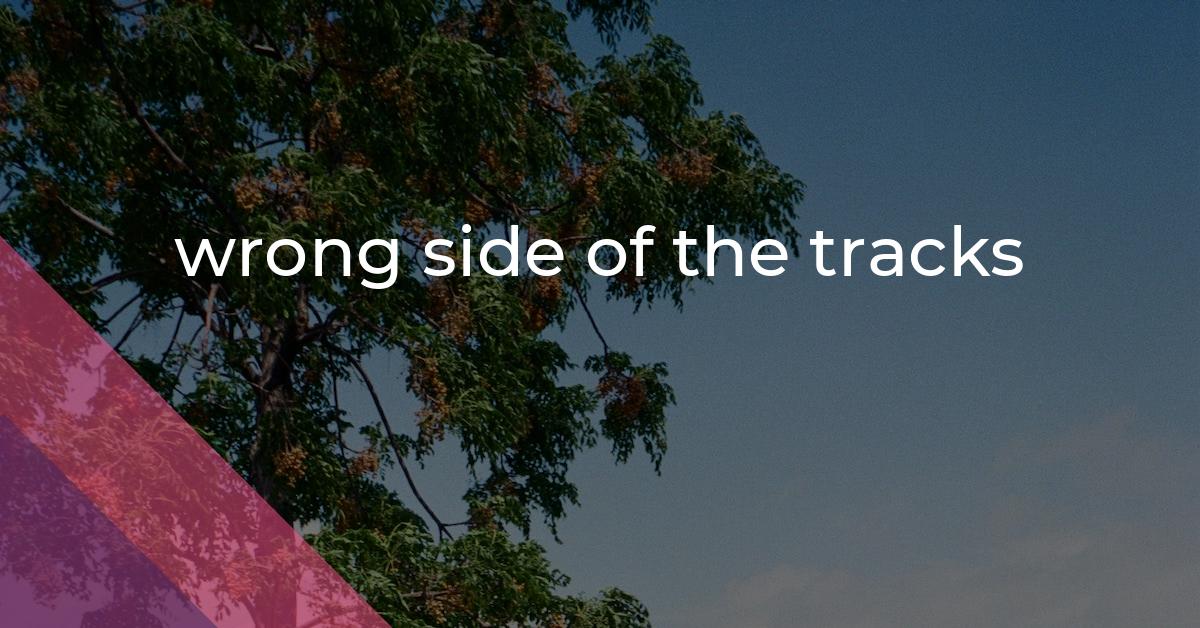wrong side of the tracks: Idiom Meaning and Origin
What does ‘wrong side of the tracks’ mean?
The idiom "wrong side of the tracks" refers to a disadvantaged or dangerous area, typically associated with lower socioeconomic status and higher crime rates.

Idiom Explorer
The idiom "worst of both worlds" refers to a situation where someone experiences the negative aspects or disadvantages of two different options or scenarios, without enjoying any of the benefits or advantages.
The idiom "walk on the wild side" means to engage in risky or unconventional behavior, often associated with breaking societal norms or boundaries.
The idiom "short end of the stick" refers to being in a disadvantaged or unfavorable position, often due to unfair treatment or circumstances beyond one's control.
An idiom often used to describe a person who is disliked or considered bad, with negative qualities or behavior.
One of the most popular idioms in English is "rotten egg." This phrase describes a person who is considered bad or unpleasant. The idiom originated in the early 19th century and is still commonly used today.
The idiom "road less traveled" means choosing an unconventional path or taking a less popular route, often in life or decision-making, different from the majority or mainstream choices.
The idiom "out of place" means something or someone not in the correct or suitable position, situation, or context.
The idiom "out of place" is a commonly used expression in the English language. It conveys a sense of not belonging or not fitting into a particular context or environment.
The idiom "other side of the tracks" refers to a socio-economic division between different neighborhoods or regions, typically representing the contrast between a wealthy area and a poorer one.
The idiom "other side" refers to a different perspective, viewpoint, or position on a particular matter or issue. It implies considering alternate opinions or taking into account different aspects of a situation.
The idiom "other end of the ball" refers to being in a completely opposite or unfamiliar situation or perspective.
The idiom "on the wrong side of history" means being on the losing or morally incorrect side of societal progress. It implies that one's actions or beliefs will be judged negatively in the future.
Tracks Tales
"other side of the tracks" is another idiom that is related to the phrase "wrong side of the tracks." It is often used to contrast with the concept of the wrong side, implying that there is a better or more desirable side to be on. This idiom can be applied in various contexts, such as discussing social class, economic status, or even personal choices. It suggests that there is a divide between two different groups or outcomes, with one being more advantageous than the other.
For example, someone might say, "I grew up on the wrong side of the tracks, but I worked hard to move to the other side and create a better life for myself." In this context, "other side of the tracks" represents a more prosperous or successful position, contrasting with the hardships and challenges of the wrong side. The idiom emphasizes the possibility of overcoming adversity and achieving upward mobility.
"on the wrong side of history" is another idiom that is related to the concept of the wrong side of the tracks. This idiom is often used in discussions about social and political issues, particularly when referring to individuals or groups whose beliefs or actions are considered to be morally or ethically wrong. It suggests that these individuals or groups will ultimately be judged unfavorably by future generations and that their position or actions will be seen as misguided or regressive.
When someone is said to be on the wrong side of history, it implies that their beliefs or actions are out of step with the progressive or enlightened values that are expected to prevail in the future. This idiom recognizes the evolving nature of societal norms and values, highlighting the importance of aligning oneself with the prevailing moral and ethical standards.
For example, someone might say, "Those who oppose equal rights for all are on the wrong side of history. The tide of progress cannot be stopped, and future generations will look back on their stance with dismay." In this context, "wrong side of history" means that opposing equal rights goes against the trajectory of societal progress and will ultimately be viewed as a moral failing.
The idioms "other side of the tracks" and "on the wrong side of history" are related to the concept of the wrong side of the tracks in different ways. "Other side of the tracks" refers to a more desirable or advantageous position, contrasting with the challenges and disadvantages of the wrong side. "On the wrong side of history" refers to beliefs or actions that are considered morally or ethically wrong and are expected to be judged unfavorably by future generations. These idioms highlight the social, economic, and moral divisions that exist in society and emphasize the importance of aligning oneself with progressive values and ideals.
Example usage
Examples of how the idiom "wrong side of the tracks" can be used in a sentence:
- He grew up on the wrong side of the tracks and had to work hard to overcome the disadvantages.
- The town's wealthiest families lived in the upper-class neighborhood, while the lower-income families were located on the wrong side of the tracks.
- She felt out of place attending the prestigious university as she came from the wrong side of the tracks.
More "Location" idioms



